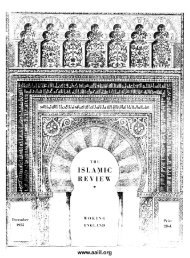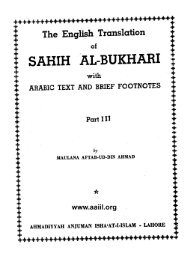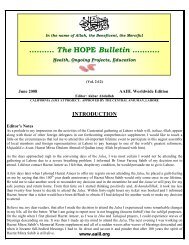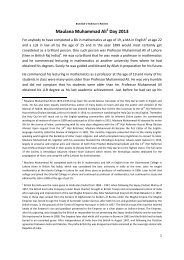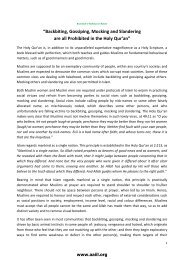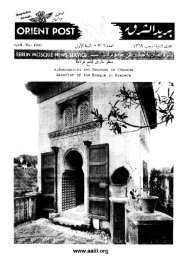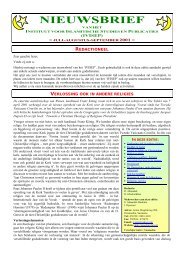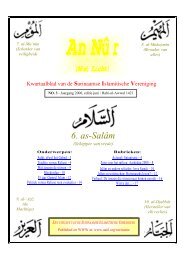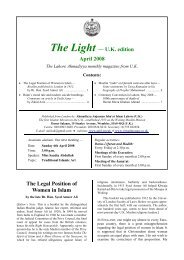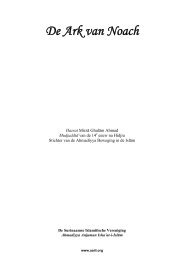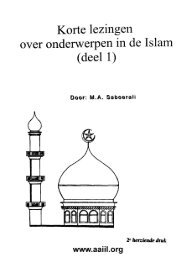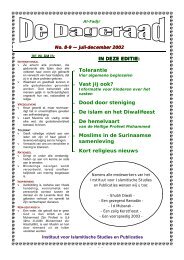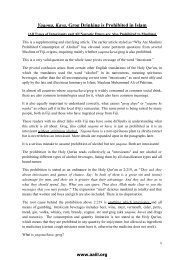October 2006 - Ahmadiyya Anjuman Isha'at-e-Islam Lahore
October 2006 - Ahmadiyya Anjuman Isha'at-e-Islam Lahore
October 2006 - Ahmadiyya Anjuman Isha'at-e-Islam Lahore
You also want an ePaper? Increase the reach of your titles
YUMPU automatically turns print PDFs into web optimized ePapers that Google loves.
the destitute exorbitant un-<strong>Islam</strong>ic interest rates. As with Shirin Ebadi and Muhammad ElBaradei, many<br />
Muslims also consider Dr Yunus a “stooge of the West.”<br />
While there are some valid critiques of the Grameen Bank model in Bangladesh, it is unfortunate that any<br />
novel idea has to be met with such contrarian zeal with few alternative solutions. The overall picture is<br />
fairly clear: Bangladesh is at least showing strongly positive signs of development, as measured by<br />
indicators developed by Pakistan’s own celebrated economist, the late Mahbub-ul-Haq (who may well<br />
have become the first Muslim to win the Nobel Prize in economics had he lived long enough).<br />
According to the director of the UN’s Human Development Report, Kevin Watkins, Bangladesh has seen<br />
child mortality falling at an annual rate 50 percent higher than India, and in <strong>2006</strong> the child survival rate is<br />
better in Bangladesh than in either India or Pakistan. This is especially remarkable for a country that has<br />
all natural odds against it with annual floods, cyclones and a capricious agricultural climate.<br />
Let us now turn to this year’s other Muslim Nobel laureate, Orhan Pamuk of Turkey, who won the Nobel<br />
Prize for literature. The late Egyptian writer Naguib Mahfouz is the only other Muslim writer to have won<br />
this prize. Both of these writers have been known to marginalize their <strong>Islam</strong>ic identity at various times,<br />
and perhaps the literature prize mirrors the peace prize in its political message. Just as Gandhi was denied<br />
the peace prize despite being an inspiration to so many later laureates, some Muslim writers may claim a<br />
measure of discrimination here, contending that only a certain liberal elite is even considered seriously. In<br />
the case of Mr Pamuk, one Turkish writer commented in the Wall Street Journal that he “has not taught<br />
anyone anything they didn’t already know but has made precisely the right noises that the progressive<br />
arbiters of taste in Europe like to hear.”<br />
Alfred Nobel, the man who perfected the alchemy of dynamite, could scarcely have imagined how<br />
momentous his legacy would be for times to come. Every autumn we await the announcements from<br />
Scandinavia about this most coveted of international honours. As the pantheon of laureates grows larger<br />
and more diverse, the <strong>Islam</strong>ic contribution to this prize remains relatively small. This is a time for<br />
introspection among Muslims and non-Muslims alike regarding the means and merits of such rewards,<br />
and how best to use them as incentives for improving the human condition.<br />
[The author of this article is Dr Saleem H Ali, an associate professor of environmental planning and<br />
conflict resolution at the University of Vermont, USA.]<br />
Contact Address:<br />
Akbar Abdullah<br />
Editor, The HOPE Bulletin<br />
Mailing Address: P.O. Box A2127<br />
211 South Clark Street<br />
Chicago, IL 60690, U.S.A.<br />
E-Mail Address: akbar_786us@yahoo.com<br />
Telephone Number: (773) 539-6892<br />
Facsimile Number: (773) 539-9975<br />
19



